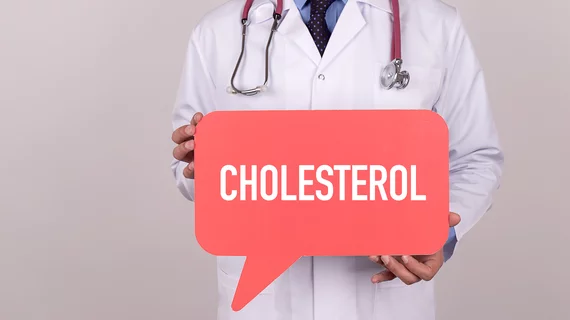A recent analysis of last year’s FOURIER trial has found evolocumab, a PCSK9 inhibitor developed to treat hyperlipidemia, can robustly reduce low-density lipoprotein cholesterol (LDL-C) in patients without any major concern for individual-level variability in response.
FOURIER proved the efficacy of evolocumab in lowering LDL-cholesterol in patients with a background of statin therapy, but some concerns have been raised regarding interindividual variation in the magnitude of LDL-C reductions in response to PCSK9 inhibitors, first author Arman Qamar, MD, and colleagues wrote in JAMA Cardiology Dec. 12.
“Furthermore, many payers require subsequent laboratory testing to demonstrate an optimal LDL-C reduction with PCSK9 inhibitors,” Qamar, of Brigham and Women’s Hospital and Harvard Medical School, and coauthors wrote. “The magnitude of individual-level heterogeneity in LDL-C level reduction with evolocumab has not been defined in a large-scale trial.”
To amend that, Qamar and his team undertook a study of FOURIER data, considering 21,768 patients in the trial who didn’t exhibit baseline variability or any inconsistencies in taking previous lipid therapies. Examining the percentage change in LDL-C levels between the study’s initiation and its end, the researchers found evolocumab reduced LDL-cholesterol by 50 percent or more in 90.5 percent of patients and by 30 percent or more in 99.8 percent of patients.
By week four of the trial, the median percent reduction in LDL-C from baseline was 66 percent. Fifty-three patients, or 0.5 percent of the total pool, saw no reduction in cholesterol.
“In contrast with what was observed for bococizumab (another cholesterol-lowering drug), development of neutralizing anti-drug antibodies were not seen in any patient in the FOURIER trial or in follow-up,” Qamar et al. wrote. “However, other theoretical possibilities exist, such as more rapid clearance of evolocumab or diminished efficacy owing to drug target alterations (e.g. rare mutations in the LDL receptor).”
The authors said the biological basis of the 53 patients’ suboptimal response to evolocumab warrants further investigation.
“[Our] findings support the consistency of robust LDL-C level reduction with evolocumab,” they wrote. “The addition of evolocumab to statin therapy provides a consistent and reliable low-density lipoprotein cholesterol level reduction in most patients.”

